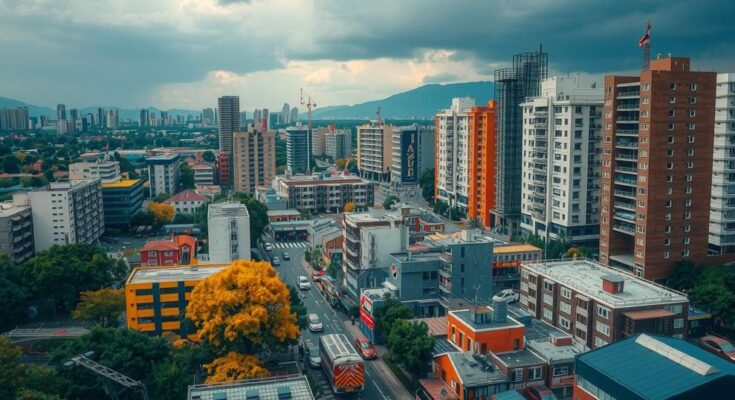The 12th World Urban Forum focused on the role of cities in combating climate change, highlighting Tokyo as a leader in sustainability and resilience. As urban populations grow, cities must adopt innovative practices to ensure sustainable development. Public-private partnerships and technology are vital in addressing the challenges posed by climate change, with a strong emphasis on community welfare and renewable energy initiatives.
Cities are increasingly recognized as central players in the global fight against climate change, accounting for 70% of greenhouse gas emissions and over 80% of GDP. The projected urban population surge to 70% by 2050, primarily in developing regions, necessitates a concerted effort to create sustainable urban environments. The 12th World Urban Forum (WUF12), organized by UN-Habitat, convened over 30,000 participants to discuss actionable strategies for transition to more resilient cities. Executive Director Anacláudia Rossbach envisioned an urban future where accessibility to green spaces and air quality are universal rights rather than privileges.
Significant challenges confront urban areas, including rising temperatures that threaten green spaces, air quality deterioration, and biodiversity loss. The increasing incidence of extreme weather exacerbates these issues, exemplified by recent tornadoes in Valencia, Spain. Problems such as water scarcity driven by climate change further complicate urban planning, leading to heightened financial demands for disaster mitigation and infrastructure upkeep. Nevertheless, WUF12 discussions revealed abundant opportunities for leveraging innovation and resilience in urban settings.
Tokyo is heralded as a model of climate resilience. Governor Yuriko Koike articulated the urgency of action against climate change, stating, “Faced with the crisis that is climate change, we will create a sustainable city model from Tokyo, a major energy consumer.” The TOKYO Resilience Project showcases advanced flood mitigation and a holistic approach to managing stormwater through large underground reservoirs.
Tokyo’s energy initiatives are groundbreaking, with plans for mandatory rooftop solar installations and innovations in vertical solar technology. The electrification of public transit with hydrogen power further exemplifies Tokyo’s commitment to sustainable energy. Governor Koike emphasized Tokyo’s investments in hydrogen technology, stating, “This fiscal year, Tokyo has doubled its budget related to hydrogen energy…”
The WUF12 underscored the critical role of technology in urban development, where artificial intelligence and the Internet of Things optimize city operations and enhance sustainability. Projects such as SusHi Tech Tokyo 2024 bring together innovations aimed at addressing climate challenges. Rossbach remarked that smart cities should prioritize people and equity rather than mere efficiency.
Public-private partnerships (PPPs) emerged as vital for sustainable urban development. Examples such as the Energy Generation and Storage Promotion Fund in Tokyo highlight collaborative efforts in financing green initiatives. Governor Koike stated, “We will reinvigorate sustainable financing through various initiatives.”
The WUF12 not only addressed pressing challenges but also envisioned the possibilities for cities to lead the global transition towards sustainability. Initiatives like those in Tokyo illustrate how urban centers can transform from major polluters into leaders in green technology. As highlighted by Governor Koike, responsibility falls on cities to decarbonize swiftly, especially as climate conditions worsen.
As cities face rapid urbanization and environmental pressures, forums like the WUF serve as platforms for dialogue and innovation. Cities possess both the capability and obligation to spearhead the shift towards a green economy. Collaborations that prioritize community welfare and sustainability take precedence, as articulated by Rossbach: “From ensuring affordable housing to advancing renewable energy, we need to foster collaborations that prioritize human well-being over profit and sustainability over convenience.”
Climate change poses urgent challenges that cities must address, given their significant contribution to global greenhouse gas emissions. With rapid urbanization expected to escalate, cities must evolve to meet new demands while transitioning to sustainable practices. Major international forums, such as the World Urban Forum, play crucial roles in bringing together leaders in urban planning and climate action to discuss innovative solutions and collaboration for a sustainable future.
The 12th World Urban Forum illuminated the critical role of cities in combating climate change and highlighted innovative strategies for urban resilience. As urban areas face unprecedented challenges, the necessity for sustainable development becomes clear. With exemplary initiatives being implemented in cities like Tokyo, a transformative shift towards green energy and equitable living environments is not only feasible but essential. Ultimately, cities are positioned to lead the global response to the climate crisis through innovation and collaborative efforts.
Original Source: www.forbes.com




